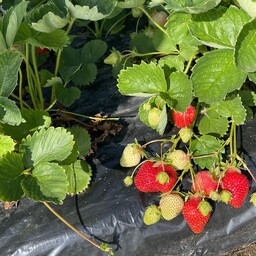Eesti marjakasvatajatel on probleeme taimekaitsevahenditega. Nad ei saa kasutada piisavalt vahendeid, mis aitaksid taimi kaitsta. See teeb nende töö raskemaks.
Joosepi talu Põlvamaal on üks suuremaid maasikakasvatajaid. Seal tehakse palju tööd, et rajada
uusi istutusalasid
. Kuid GPS-i signaal on tihti häiritud, mis teeb töö raskemaks. Kliima muutub ja sellega ka
taimede haigused ja kahjurid
.
uusi istutusalasid
Tõlge fraasile: uusi istutusalasid
EN
new planting areas
taimede haigused ja kahjurid
Tõlge fraasile: taimede haigused ja kahjurid
EN
plant diseases and pests
Renet Roositalu, Joosepi talu omanik, ütleb, et Eestis puudub
ühtne taimekaitsepoliitika
. Näiteks ripslane, mis on
suur kahjur maasikapõldudel
, võib hävitada kogu saagi. Eestis on lubatud ainult üks vahend ripslase vastu, kuid Poolas on neid kaheksa.
ühtne taimekaitsepoliitika
Tõlge fraasile: ühtne taimekaitsepoliitika
EN
unified plant protection policy
suur kahjur maasikapõldudel
Tõlge fraasile: suur kahjur maasikapõldudel
EN
a major pest in strawberry fields
Eesti Aiandusliidu tegevjuht Raimond Strastin ütleb, et Eesti on taimekaitsevahendite tootjate jaoks
väike turg
. Seetõttu ei ole neil huvi oma tooteid siin registreerida. Samas ei tohi Eestis kasutada vahendeid, mis pole siin registreeritud.
väike turg
Tõlge fraasile: väike turg
EN
small market
Põllumajandusminister Hendrik Terras ütleb, et lahendus võiks olla
taimekaitsevahendite lubamine
regioonipõhiselt. Kui vahend on lubatud näiteks Lätis või Leedus, peaks see olema lubatud ka Eestis.
taimekaitsevahendite lubamine
Tõlge fraasile: taimekaitsevahendite lubamine
EN
approval of plant protection products
Euroopa Komisjoni uus põllumajandus- ja toiduvolinik Cristophe Hansen ütleb, et ta mõistab Eesti probleemi. Ta lubab otsida lahendust, et
toidujulgeolek
oleks tagatud.
toidujulgeolek
Tõlge fraasile: toidujulgeolek
EN
food security
Estonian berry growers are facing problems with plant protection products. They cannot use enough resources to protect plants, making their work more difficult.
Joosepi Farm in Põlva County is one of the largest strawberry growers. A lot of work is done there to establish new planting areas. However, the GPS signal is often disrupted, making the work more difficult. The climate is changing, and with it, plant diseases and pests are also increasing.
Renet Roositalu, the owner of Joosepi Farm, says that Estonia lacks a unified plant protection policy. For example, the strawberry weevil, which is a major pest in strawberry fields, can destroy the entire harvest. In Estonia, only one product is approved against the weevil, while in Poland, there are eight.
Raimond Strastin, the executive director of the Estonian Horticulture Association, says that Estonia is a small market for plant protection product manufacturers. Therefore, they are not interested in registering their products here. At the same time, products not registered in Estonia cannot be used.
Agriculture Minister Hendrik Terras says that a solution could be the regional approval of plant protection products. If a product is approved, for example, in Latvia or Lithuania, it should also be approved in Estonia.
The European Commission’s new Commissioner for Agriculture and Food, Cristophe Hansen, says he understands Estonia’s problem. He promises to seek a solution to ensure food security.

